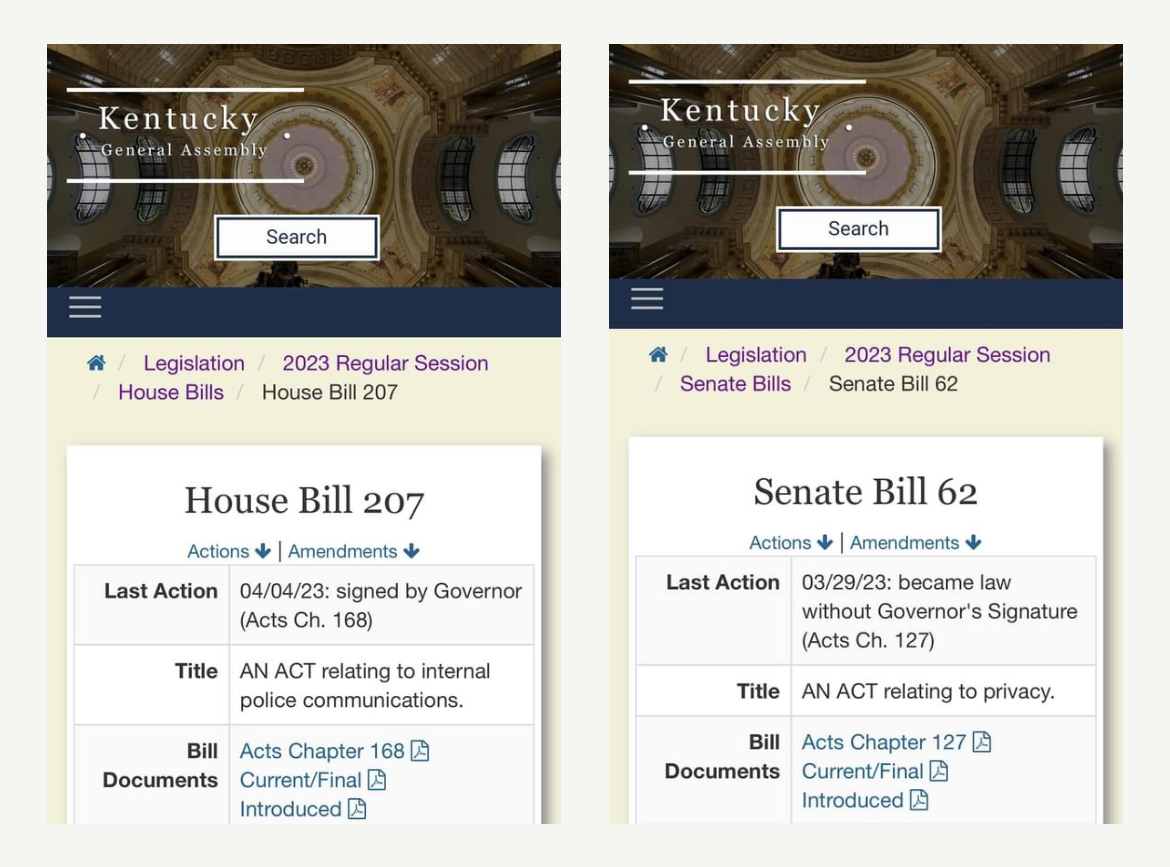
Although the open records law emerged relatively unscathed from the 2023 Regular Session of the Kentucky General Assembly, it was not entirely overlooked in the legislative maelstrom.
One new exceptions to the open records law -- replacing the former KRS 61.878(1)(r) — authorizes nondisclosure of "Records confidentially maintained by a law enforcement agency in accordance with a wellness program, including an early intervention system, as described in KRS 15.409."
A "wellness program" is a "program created by a law enforcement agency to support the physical and mental health of law enforcement personnel."
https://apps.legislature.ky.gov/law/statutes/statute.aspx?id=54125
It bumps the former KRS 61.878(1)(r), authorizing nondisclosure of "Communications of a purely personal nature unrelated to any governmental function" to KRS 61.878(1)(s), a curious move by the statute reviser but one that should cause limited confusion.
Both the new KRS 61.878(1)(r) and KRS 61.878(1)(s) are largely redundant exceptions -- the latter almost certainly already protected by the established privacy exception, KRS 61.878(1)(a), and the former certainly protected by the statute that "necessitated" it's enactment, KRS 15.409.
KRS 15.409 is captioned, "Wellness program -- Confidentiality of records and communications -- Exceptions to privilege."
It clearly states that "all proceedings, records, opinions, conclusions, and recommendations arising from any aspect of a wellness program shall be confidential and privileged from disclosure, regardless of who possesses them."
Leaving no room for doubt (where none existed), lawmakers added a new exception to the ever-expanding list of open records exception. Where, for decades, there were 12 exceptions, now there are 19 (and counting) exceptions.
The other new exception to the open records law is separately codified at KRS 61.791 to 61.799.
https://apps.legislature.ky.gov/law/statutes/statute.aspx?id=54008
Subject to several statutory carve-outs, it exempts "personal information from disclosure under the Kentucky Open Records Act."
https://apps.legislature.ky.gov/law/statutes/statute.aspx?id=54009
In contrast to a more generalized reference to "information of a personal nature" found in the privacy exception to the Open Records Act, KRS 61.878(1)(a), "personal information" is defined in KRS 61.791 as "any list, record, registry, roll, roster, or other compilation of data of any kind that directly or indirectly identifies a person as a member, supporter, volunteer, or donor of financial or nonfinancial support to any nonprofit organization[.]"
The new statute — described by its sponsor, Sen. Whitney Westerfield, as a codification of a U.S. Supreme Court ruling striking down a California law that compelled the names of donors to nonprofits to be disclosed to the state attorney general — prompted criticism from the Kentucky Open Government Coalition and the Kentucky Press Association.
https://www.courier-journal.com/story/news/politics/2023/02/22/senate-a…;
https://kyopengov.org/blog/personal-privacy-protection-act-senate-bill-…
To begin, no Kentucky public agency collects this information — much less makes it accessible upon request. The law, enacted “out of an abundance of caution,” is more likely to chill the release of nonexempt public information by agencies and officials concerned about the penalty provisions in the new law.
https://apps.legislature.ky.gov/law/statutes/statute.aspx?id=54011
Perhaps separating the new law, captioned “Nondisclosure of Personal Information Act” from the Open Records Act will limit the potential for confusion and harm. Perhaps not.
In both Tennessee and Virginia, similar laws were recently enacted — we were advised at the time of SB 62’s passage — with minimal blowback.
But the enactment of both new statutes is typical of the unnecessary overreach the legislature far too often exercises and, in the case of the new “Nondisclosure of Personal Information Act,” it’s propensity for introducing one size fits all “model legislation” — drafted by outside entities — that does not fit Kentucky at all.



